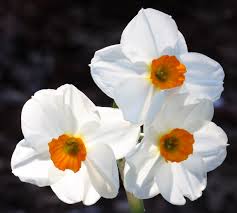
记忆方法
记忆单词“narcissus”的方法是将其与“narcotic”和“self-admiration”联系起来。想象一种花朵(narcissus,水仙花)在“narcotic”(使人陶醉的)的光照下自我欣赏(self-admiration),从而联想到“narcissus”这个单词。
以上内容由AI生成, 仅供参考和借鉴
中文词源
narcissus 水仙,水仙花
词源未知,一种观点是认为来自古希腊美少年Narcissus,死后化作水仙花,或因别人在他溺水的地方发现了水仙花而得名,或来自希腊语narke,麻木,失去知觉,词源同narcotic,因水仙花鳞茎的毒性液体可使人麻木而得名。
英语词源
- narcissus
-
narcissus: [16] The plant-name narcissus goes back via Latin to Greek narkissos. Writers of ancient times such as Pliny and Plutarch connected it with Greek nárkē ‘numbness’ (source of English narcotic), a tempting inference given the plant’s sedative effect, but in fact it probably came from an unknown pre- Greek Aegean language. In Greek mythology the name passed to a vain youth who was punished by the gods for spurning the love of Echo.
They made him fall in love with the reflection of his beautiful features in a pool. He died gazing at his own image and was changed into a narcissus plant. In the 19th century his story inspired the word narcissism. At first it was just a general term for excessive self-admiration and self-centredness, but in the 1890s (probably at the hands of the sexologist Havelock Ellis) it became a technical term for a specific personality disorder marked by those traits.
- narcissus (n.)
- type of bulbous flowering plant, 1540s, from Latin narcissus, from Greek narkissos, a plant name, not the modern narcissus, possibly a type of iris or lily, perhaps from a pre-Greek Aegean word, but associated with Greek narke "numbness" (see narcotic) because of the sedative effect of the alkaloids in the plant.
权威例句
- 1. The myth of Narcissus is described in Ovid's work.
- 有关那喀索斯的神话故事在奥维德的作品中有过描述。
- 2. The daffodil belongs to the genus Narcissus.
- 黄水仙是水仙属植物.
- 3. Now I still do not know what a blooming Narcissus looks like.
- 知道现在我也不知道一朵盛开的水仙花是什么样子的.
- 4. The narcissus is becoming more and more lively under mom's careful attendance.
- 水仙花在妈妈的精心调养下越发水灵灵的了.
- 5. She was like a narcissus trembling in the wind.
- 她像一株在风中摇动的水仙.